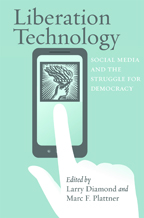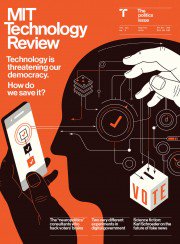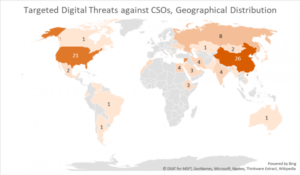 Russia has used information warfare to influence election outcomes with the aim of weakening the values, defenses and self-belief of Western democracies, notes Sir Peter Westmacott, a former British Ambassador to the US.
Russia has used information warfare to influence election outcomes with the aim of weakening the values, defenses and self-belief of Western democracies, notes Sir Peter Westmacott, a former British Ambassador to the US.
The revelations that Iran is following the Kremlin’s disinformation playbook are a further indication of what one prominent analyst calls “the Internet’s Lost Promise.”
The advent of the internet – alongside the spread of democracy and markets – was hailed as the torch-bearer of Western values in the 1990s, says the University of Melbourne’s Mark Triffit.
“Its unprecedented capacity to connect and inform led many to predict it would enrich political and social debate, creating more respectful deliberation and generally drive a far more vibrant and inclusive public sphere,” he writes. “Yet, the dream of a digital eco-system that represents the best of Enlightenment ideals is effectively dead.”
There has been a pronounced shift from liberation technology to authoritarian technique, observers suggest.
 The tech firms and their boosters either didn’t imagine that “democratizing” technologies would be used by anti-democrats too, or else believed that truth and freedom would inevitably defeat misinformation and repression, notes MIT Technology Review editor Gideon Lichfield:
The tech firms and their boosters either didn’t imagine that “democratizing” technologies would be used by anti-democrats too, or else believed that truth and freedom would inevitably defeat misinformation and repression, notes MIT Technology Review editor Gideon Lichfield:
One can wonder if voters are even capable of making free choices anymore, as political campaigns microtarget citizens in key districts with surgical precision and “neuropolitical” consultants use cognitive science to identify preferences people didn’t even know they had. Convincing video “deepfakes” are becoming easy to create, Twitter bots that currently spew cookie-cutter propaganda on autopilot will soon be smart enough to engage individual users in simulated conversation. Big data is disrupting the cozy world of political lobbying…And with November’s midterms approaching, the US’s election systems are still woefully insecure.

Credit: MIT Tech Review
All this has given rise to a new breed: the Depressed Former Internet Optimist (DFIO), notes one expert.
Many Optimists believed that the structure of the internet by itself—manifested in collaborative projects such as wikis or crowdfunding—would bend social outcomes in their favor, notes Tim Hwang, director of the Ethics and Governance of AI Initiative, a joint program of the MIT Media Lab and Harvard’s Berkman Klein Center:
One response to the events of 2016 has been to revisit this assumption, claiming that while the basics might have been right, more work is needed to realize the original vision. Revisionists want to preserve the original aspirations for the web through amendment, calling for a new effort to design better communities and systems for governing society online. They extol the virtues of stronger community guidelines, ways to influence behavior through “nudging” interfaces, and the power of user-centered design.
 The Internet would never have become such a transformational technology were it not for openness—a quality that was inherent in its design yet nurtured by government policies, adds Karen Kornbluh, Senior Fellow for Digital Policy at the Council on Foreign Relations and a member of the Broadcasting Board of Governors.
The Internet would never have become such a transformational technology were it not for openness—a quality that was inherent in its design yet nurtured by government policies, adds Karen Kornbluh, Senior Fellow for Digital Policy at the Council on Foreign Relations and a member of the Broadcasting Board of Governors.
But over time, those policies did not keep up with changes in technology or the way it was used. The victims of this lag have been those who initially benefited the most from the Internet: democracies, champions of freedom, and ordinary citizens, she writes for Foreign Affairs.

Credit: CSIS
The Kremlin is also likely employing its playbook in Israel, according to Ilya Zaslavskiy, a Washington, DC-based expert on Russia and head of research at the Free Russia Foundation.
“We now know for a fact that Russia has been interfering on a massive scale in US, German and UK elections and referendums,” he told The Times of Israel. “Israel is of strategic importance to the Kremlin — because Israel is actually one of the forces that could contain Russia, could prevent some of the abuses that Russians are carrying out,” added Zaslavskiy, a member of the advisory board at the Hudson Institute’s Kleptocracy Initiative and an academy associate at Britain’s Royal Institute of International Affairs (Chatham House) think tank. RTWT
 It is time to take back the Internet and the United States is uniquely positioned to assume the lead on this task, argues Kornbluh, who served as U.S. Ambassador to the Organization for Economic Cooperation and Development:
It is time to take back the Internet and the United States is uniquely positioned to assume the lead on this task, argues Kornbluh, who served as U.S. Ambassador to the Organization for Economic Cooperation and Development:
As the promoter of the key early policies and the home to many of the largest Internet companies, only it can drive the development of a framework that ensures the openness and transparency necessary for democratic debate without harming innovation. But if the United States shirks its responsibility, it will further empower the adversaries of democracy: revisionist states, authoritarian governments, and fraudsters bent on exploiting the Internet for their own, dangerous ends.
The Challenge of Cyber Strategy is the subject of a meeting of the Atlantic Council’s Cyber Statecraft Initiative on Wednesday, August 22, from 4:00 p.m. to 5:30 p.m.
A panel of experts will discuss the nature of cyber as a modern form of political warfare and how to navigate the spectrum of cyber operations. A reception will follow the event. RSVP







